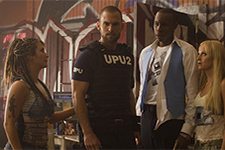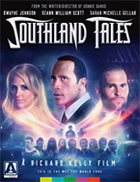Southland Tales
|  Southland Tales, Richard Kelly’s insanely ambitious fever dream of a science fiction/political satire/anti-fantasy, roars at you with unapologetic gusto, inflaming the senses with its rich tapestry of post-millennial visuals and assaulting the mind with its skewering of the Far Right and the Far Left, thus all but ensuring hatred from both ends of the political spectrum since neither tends to like being caricatured and mocked. The film’s own journey is almost as strange as the one it depicts: After being roundly booed at its disastrous 2006 premiere at the Cannes Film Festival in a 160-minute cut (which has finally been made available via Arrow Video’s new Blu-ray), Kelly retooled it by slicing away 20 minutes, recording and re-recording voice-over narration for the expanded opening exposition, and adding more special effects. It was all to little avail, though, as the film quickly sank at the box office when it finally debuted in limited release in October 2007, already doomed by rumor and bad word of mouth. As with Kelly’s directorial debut, the apocalyptic teen satire Donnie Darko (2001), Southland Tales has gone on to become a cult item, beloved by those get its ambitions, forgive its flaws, and embrace its narrative conundrums, political grandiosity, and all-around weirdness. As Kelly himself has noted, Southland Tales is effectively an “unfinished” film, whether you are viewing the longer Cannes cut or the retooled theatrical cut, because both versions were made with limited resources and a stretched-thin budget that simply could not provide adequate canvas for Kelly’s ever-expanding vision. The majority of the film takes place around the Fourth of July weekend in an alternate 2008 (which, at the time of the film’s release, was the near future), although it begins three years earlier with a truly frightening sequence in which home video footage of a neighborhood party in Abilene, Texas, is rocked by a nuclear explosion. In response, the U.S. government cracks down, curtailing civil liberties, launching offensives in the Middle East, and assuming control over the Internet using a private corporation called USIDnet, which has also assumed control of all other forms of law enforcement. The state is in a state of panic, paranoia, and complete confusion, which, the film argues, is not a far leap from where we have been since 9/11. To try to summarize the exact mechanics of the plot would take about as long as the film takes to play, so I’ll just sketch in the bare minimum. Our protagonist is Boxer Santaros (Dwayne Johnson), an action movie star who is married to the daughter (Mandy Moore) of vice-presidential hopeful Senator Bobby Frost (Holmes Osborne), whose wife (Miranda Richardson) runs USIDnet. Boxer is kidnapped and emerges from the desert with no memory, after which time he falls in with Krysta Now (Sarah Michelle Gellar), a free-spirit porn star with her own View-like reality talk show. Meanwhile, two radical groups are vying to manipulate Boxer to their own ends. One group, led by filmmaker Cyndi Pinziki (Nora Dunn), wants to blackmail Senator Frost into curtailing USIDnet’s powers. At the same time, a group of self-proclaimed neo-Marxists (who don’t seem to know anything about Marxism except its antagonistic stance toward capitalism and God) led by a violent beat poet (Cheri Oteri) want to frame Boxer for a racist murder. To do this, they have kidnapped a police officer (Seann William Scott) and plan to replace him with his twin brother. All of this is being orchestrated by a German inventor named Baron Von Westphalen (Wallace Shawn), who has developed an unlimited source of energy called Fluid Karma, which also leads to the development of a powerful drug. Oh, and the film is narrated from the margins by a disillusioned Iraq war veteran named Private Pilot Abilene (Justin Timberlake). There is more—oh so very, very much more (including Kevin Smith in militaristic Orson Welles drag)—and how it all fits together is something of a mystery, even after the final credits are rolling, which is likely why audiences rejected the film so violently. Part of this is due to the fact that Southland Tales is not meant to stand alone. The three “chapters” comprising the film (each of which is named after a song) are actually the final three parts of a six-part story (some strange wink to Star Wars?), the first three of which are told in a graphic novel series. Thus, the film is but one piece of a larger multimedia universe, which is fitting given the film’s visual obsession with overloaded cable-news-style multimedia presentations of plot points and backstory. However, ambiguity and confusion are not the real problem. The film isn’t nearly as incomprehensible as it would seem, although parts of it are certainly befuddling and its tonal shifts are radical to the point of being ethereal. This is a film, after all, that toys with conspiracy theories, action movies clichés, and avant-garde density—and did I mention that it quotes heavily from T.S. Eliot’s “The Wasteland,” Robert Frost’s “The Road Not Taken,” and the Book of Revelation and that it’s also a remarkably funny comedy? Rarely has a film not produced by Lorne Michaels contained so many Saturday Night Live personalities both past and present (in addition to the aforementioned Nora Dunn and Cheri Oteri, Amy Poheler has a small role, as does Jon Lovitz as a violent, racist cop). In fact, if Southland Tales doesn’t work, it may be because it comes too close to working, too close to making sense. Many of the same critics and audiences who fall over themselves praising the anti-narrative conundrums offered by David Lynch were critical of Southland Tales, most likely because they confused it for a film that was trying to make sense but failed. In fact, Kelly’s film, which he describes as simply “a political satire about an alternate future,” is not quite weird enough. For too long it dangles before you the carrot of clarity, only to jerk it away again and again. Just when you think you may be grasping what it’s all about, you’re suddenly confronted with some kind of visual or narrative non sequitur, such as when the film veers into bizarro music video territory with Timberlake drunkenly lip-synching to The Killers’ “All These Things That I’ve Done” while dancers in tight nurse costumes high-kick on top of skee ball lanes. And frankly, despite having seen the film at least a dozen times, I still haven’t quite decided whether the film’s does-it-or-doesn’t-it-make-sense divisiveness is the key to its unappreciated genuis or the lynchpin to its demise. Even after finally getting to see the fabled Cannes cut, which is free of the ponderous, CGI-enhanced opening exposition via the “Doomsday Scenario Interface” and expands on many scenes in the theatrical version, I still struggle with exactly what to make of the film and its ambitions, which I suspect is exactly what Kelly wants. Should it have gone straight into pure Dziga Vertov-era Godardian counter-cinema, or is its playful skewering of abstract pretensions with daggers of coherence its weapon of choice against both arty Leftists and literal-minded Righties? Or was Kelly trying to please both and just pissed them all off? One thing we can say for sure, though: After you’ve seen Southland Tales, you know you’ve really seen something.
Copyright © 2021 James Kendrick Thoughts? E-mail James Kendrick All images copyright © Arrow Video | |||||||||||||||||||||||||||||
Overall Rating: 


 (3.5)
(3.5)


